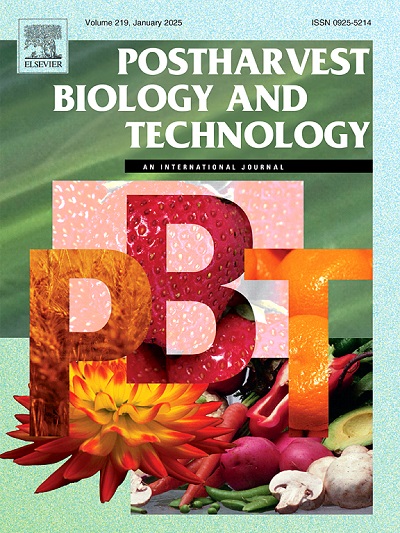Mango MiEIL4 modulates starch degradation during fruit ripening by upregulating the expression of β-amylase and α-amylase genes
IF 6.8
1区 农林科学
Q1 AGRONOMY
引用次数: 0
Abstract
Starch degradation contributes to the sweetening and softening of mango (Mangifera indica) fruit, but the molecular regulatory mechanism underlying this process remains unexplored. In this study, the levels of starch, amylose, and amylopectin exhibited a gradual decline, while soluble sugars increased progressively during the postharvest ripening of four mango cultivars: ‘Guifei’, ‘Hongxiangya’, ‘Jinhuang’, and ‘Tainong’. Moreover, the activities of the starch digesting enzymes amylase, α-amylase, and β-amylase, as well as the expression levels of genes encoding these enzymes were all up-regulated during the ripening in these four mango cultivars. Importantly, an important transcriptional regulator in the ethylene-responsive pathway, MiEIL4, was identified based on its upregulation during fruit ripening, and it was a nuclear-localized transcriptional activator. Transiently overexpressing MiEIL4 in mango fruit promoted starch degradation and thus fruit ripening by upregulating the expression of starch hydrolytic genes. MiEIL4 stimulated the transcription of MiAMY3, MiBAM4, MiBAM5, MiBAM6, MiBAMX1, and MiBAMX2, but it only directly bound to the MiBAMX2 promoter. Taken together, these observations suggest that MiEIL4 is an important activator of starch breakdown during mango fruit ripening by upregulating the expression of starch degrading genes, broadening our knowledge of starch-degradation in mango and other climacteric fruits.
芒果MiEIL4通过上调β-淀粉酶和α-淀粉酶基因的表达,调控果实成熟过程中淀粉的降解
淀粉降解有助于芒果(Mangifera indica)果实的变甜和软化,但这一过程背后的分子调控机制尚不清楚。在本研究中,‘贵飞’、‘红香雅’、‘金黄’和‘泰农’4个芒果品种采后成熟过程中,淀粉、直链淀粉和支链淀粉含量呈逐渐下降趋势,而可溶性糖含量呈逐渐上升趋势。4个芒果品种的淀粉消化酶淀粉酶、α-淀粉酶和β-淀粉酶活性以及这些酶的编码基因表达量均在成熟过程中上调。重要的是,在乙烯响应途径中,一个重要的转录调节因子MiEIL4在果实成熟过程中被发现上调,它是一个核定位的转录激活因子。MiEIL4在芒果果实中短暂过表达,通过上调淀粉水解基因的表达促进淀粉降解,从而促进果实成熟。MiEIL4刺激了MiAMY3、MiBAM4、MiBAM5、MiBAM6、MiBAMX1和MiBAMX2的转录,但它只直接结合到MiBAMX2的启动子上。综上所述,这些观察结果表明MiEIL4是芒果果实成熟过程中淀粉降解的重要激活因子,通过上调淀粉降解基因的表达,扩大了我们对芒果和其他更年期水果淀粉降解的认识。
本文章由计算机程序翻译,如有差异,请以英文原文为准。
求助全文
约1分钟内获得全文
求助全文
来源期刊

Postharvest Biology and Technology
农林科学-农艺学
CiteScore
12.00
自引率
11.40%
发文量
309
审稿时长
38 days
期刊介绍:
The journal is devoted exclusively to the publication of original papers, review articles and frontiers articles on biological and technological postharvest research. This includes the areas of postharvest storage, treatments and underpinning mechanisms, quality evaluation, packaging, handling and distribution of fresh horticultural crops including fruit, vegetables, flowers and nuts, but excluding grains, seeds and forages.
Papers reporting novel insights from fundamental and interdisciplinary research will be particularly encouraged. These disciplines include systems biology, bioinformatics, entomology, plant physiology, plant pathology, (bio)chemistry, engineering, modelling, and technologies for nondestructive testing.
Manuscripts on fresh food crops that will be further processed after postharvest storage, or on food processes beyond refrigeration, packaging and minimal processing will not be considered.
 求助内容:
求助内容: 应助结果提醒方式:
应助结果提醒方式:


